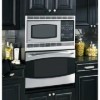GE PT970SMSS Owners Manual - Page 25
How to Set the Oven for Broiling, Broiling Guide, ge.com, Always broil with the door, closed.
 |
UPC - 084691150992
View all GE PT970SMSS manuals
Add to My Manuals
Save this manual to your list of manuals |
Page 25 highlights
Safety Instructions Operating Instructions Care and Cleaning Troubleshooting Tips Consumer Support ge.com Close the door. Always broil with the door closed. NOTE: Broil will not work if the temperature probe is plugged in. How to Set the Oven for Broiling Close the door. Always broil with the door closed. Place the meat or fish on a broiler grid in a broiler pan. Follow suggested rack positions in the Broiling Guide. If your oven is connected to 208 volts, rare steaks may be broiled by preheating the broiler and positioning the oven rack one position higher. Broiling Guide Press the Broil Hi/Lo pad once for HI Broil. To change to LO Broil, press the Broil Hi/Lo pad again. Press the Start pad. When broiling is finished, press the Clear/Off pad. The size, weight, thickness, starting temperature and your preference for doneness will affect broiling times. This guide is based on meats at refrigerator temperature. †The U.S. Department of Agriculture says "Rare beef is popular, but you should know that cooking it to only 140°F means some food poisoning organisms may survive." (Source: Safe Food Book. Your Kitchen Guide. USDA Rev. June 1985.) Food Ground Beef Well Done Beef Steaks Rare† Medium Well Done Rare† Medium Well Done Chicken Lo Broil Lo Broil Lobster Tails Lo Broil Fish Fillets Hi Broil Lo Broil Ham Slices (precooked) Pork Chops Well Done Lamb Chops Medium Well Done Medium Well Done Garlic Bread Lo Broil Quantity and/ or Thickness 1 lb. (4 patties) 1/2 to 3/4″ thick Rack First Side Second Side Position Time (min.) Time (min.) Comments E or F 10 E or F 10 7 Space evenly. Up to 9 8 patties take about the same time. 1″ thick 1 to 11⁄2 lbs. 11⁄2″ thick 2 to 21⁄2 lbs. 1 whole 2 to 21⁄2 lbs., split lengthwise Pieces Boneless 2-4 6 to 8 oz. each 1/4 to 1/2″ thick E E E E E E C B or C B or C C D 8 10 12 10 15 25 25 25-35 15-20 18-20 18-25 E 5 F 5 1″ thick D 5 2 (1/2″ thick) E 10 2 (1″ thick) about 1 lb. D 15 6 8 10 8 14-16 20-25 10 15-20 10-15 Do not turn over. N/A 5 5 5 10 15 Steaks less than 1″ thick cook through before browning. Pan frying is recommended. Slash fat. Reduce time about 5 to 10 minutes per side for cut-up chicken. Brush each side with melted butter. Broil skin-side-down first. Cut through back of shell. Spread open. Brush with melted butter before broiling and after half of broiling time. Handle and turn very carefully. Brush with lemon butter before and during cooking, if desired. Preheat broiler to increase browning. Increase time 5 to 10 minutes per side for 11⁄2″ thick or home-cured ham. Slash fat. 2 (1″ thick) about 10 E 10 to 12 oz. E 12 9 Slash fat. 10 2 (11⁄2″ thick) about 1 lb. E 14 12 E 17 12-14 E 3 N/A 25















